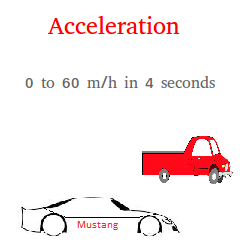Definition of Acceleration
The definition of acceleration is a little more complex than that of the speed or the velocity. May be if you clearly see the difference between the two, it will help you to avoid common pitfalls. So what is the difference between speed and acceleration?
The speed is how fast you can get somewhere.
The word somewhere tells you that some distance is involved.
The word fast tells you that time is involved.
For example, let's say that a store is 8 miles away and your Toyota camry can make it to the store in 10 minutes.
Below are different ways to express the rate or the speed at which the car can cover this distance:
- 8 mile per 10 minutes
- 16 miles per 20 minutes
- 24 miles per 30 minutes
- 48 miles per hour
And this is where the definition of speed came from.
Now, if you want to know how fast the speed can change to take you to the store, you are talking about acceleration.
Here is a situation where you will care about the acceleration of your car.

Suppose on your way to the store, there is one last traffic light. You stop at that traffic light and a ford mustang Shelby stops next to you and wants to race you.
You are no match if you are driving a pickup truck that can do 0 to 60 miles per hour in 12 second because the mustang can do the same in 4 second.
See below a description of the acceleration or how fast the speed of the mustang is changing.
15 miles per hour 1 second
30 miles per hour 2 seconds
45 miles per hour 3 seconds
60 miles per hour 4 seconds
Every second, the speed of the mustang increases or changes by 15 miles per hour.
See below a description of the acceleration or how fast the speed of the truck is changing
5 miles per hour 1 second
10 miles per hour 2 seconds
15 miles per hour 3 seconds
20 miles per hour 4 seconds
25 miles per hour 5 second
30 miles per hour 6 seconds
35 miles per hour 7 seconds
40 miles per hour 8 seconds
45 miles per hour 9 second
50 miles per hour 10 seconds
55 miles per hour 11 seconds
60 miles per hour 12 seconds
Every second, the speed of the truck increases or changes by 5 miles per hour.
You can see that the mustang increases its speed faster than the truck . We says that it has a greater acceleration and we can write:
And this is where the definition of acceleration came from.
The 15 m/h.s is read as " 15 miles per hour-second
For the Mustang,
The change in speed is 30 - 15 = 15 or 45 - 30 = 15
The time interval is 2 - 1 = 1 or 3 - 2 = 1 etc.
When advertisers say that a car can go from 0 to 60 in 8 s, they are talking about the car acceleration, not the speed.
Expanding our definition of acceleration
It is not just a change in speed that causes acceleration.
Acceleration can also be caused by changing the direction of motion.
If the road curves, you will feel that your body is trying to move toward the outside of the curve.
You are experiencing acceleration even if your speed is constant.
That is why the definition of acceleration is best described as the velocity divided by time.
Acceleration just like velocity is directional. A change in either the speed, the direction, or both will cause acceleration.